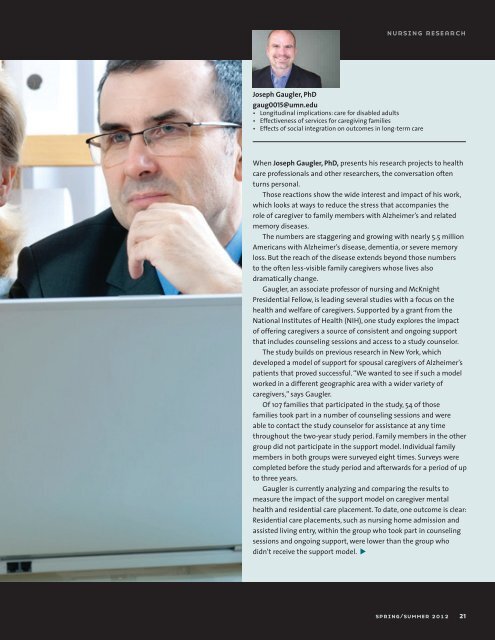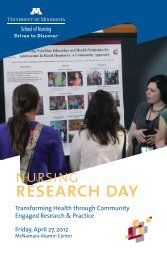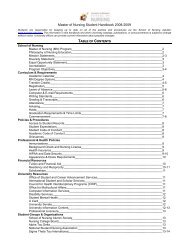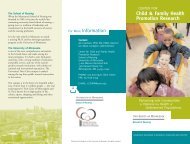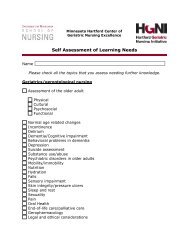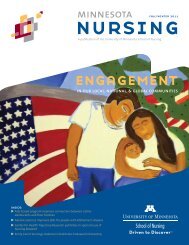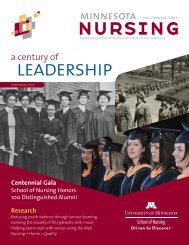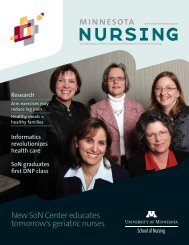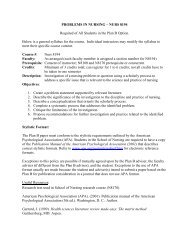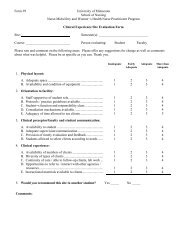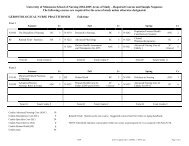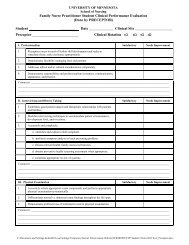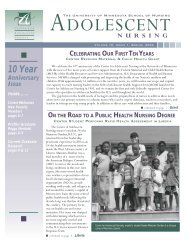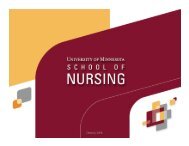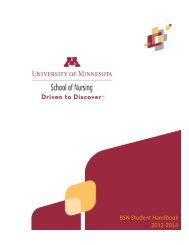Minnesota Nursing Magazine Spring/Summer 2012 - School of ...
Minnesota Nursing Magazine Spring/Summer 2012 - School of ...
Minnesota Nursing Magazine Spring/Summer 2012 - School of ...
Create successful ePaper yourself
Turn your PDF publications into a flip-book with our unique Google optimized e-Paper software.
nursing research<br />
Joseph Gaugler, PhD<br />
gaug0015@umn.edu<br />
• Longitudinal implications: care for disabled adults<br />
• Effectiveness <strong>of</strong> services for caregiving families<br />
• Effects <strong>of</strong> social integration on outcomes in long-term care<br />
When Joseph Gaugler, PhD, presents his research projects to health<br />
care pr<strong>of</strong>essionals and other researchers, the conversation <strong>of</strong>ten<br />
turns personal.<br />
Those reactions show the wide interest and impact <strong>of</strong> his work,<br />
which looks at ways to reduce the stress that accompanies the<br />
role <strong>of</strong> caregiver to family members with Alzheimer’s and related<br />
memory diseases.<br />
The numbers are staggering and growing with nearly 5.5 million<br />
Americans with Alzheimer’s disease, dementia, or severe memory<br />
loss. But the reach <strong>of</strong> the disease extends beyond those numbers<br />
to the <strong>of</strong>ten less-visible family caregivers whose lives also<br />
dramatically change.<br />
Gaugler, an associate pr<strong>of</strong>essor <strong>of</strong> nursing and McKnight<br />
Presidential Fellow, is leading several studies with a focus on the<br />
health and welfare <strong>of</strong> caregivers. Supported by a grant from the<br />
National Institutes <strong>of</strong> Health (NIH), one study explores the impact<br />
<strong>of</strong> <strong>of</strong>fering caregivers a source <strong>of</strong> consistent and ongoing support<br />
that includes counseling sessions and access to a study counselor.<br />
The study builds on previous research in New York, which<br />
developed a model <strong>of</strong> support for spousal caregivers <strong>of</strong> Alzheimer’s<br />
patients that proved successful. “We wanted to see if such a model<br />
worked in a different geographic area with a wider variety <strong>of</strong><br />
caregivers,” says Gaugler.<br />
Of 107 families that participated in the study, 54 <strong>of</strong> those<br />
families took part in a number <strong>of</strong> counseling sessions and were<br />
able to contact the study counselor for assistance at any time<br />
throughout the two-year study period. Family members in the other<br />
group did not participate in the support model. Individual family<br />
members in both groups were surveyed eight times. Surveys were<br />
completed before the study period and afterwards for a period <strong>of</strong> up<br />
to three years.<br />
Gaugler is currently analyzing and comparing the results to<br />
measure the impact <strong>of</strong> the support model on caregiver mental<br />
health and residential care placement. To date, one outcome is clear:<br />
Residential care placements, such as nursing home admission and<br />
assisted living entry, within the group who took part in counseling<br />
sessions and ongoing support, were lower than the group who<br />
didn’t receive the support model. u<br />
spring/summer <strong>2012</strong> 21


